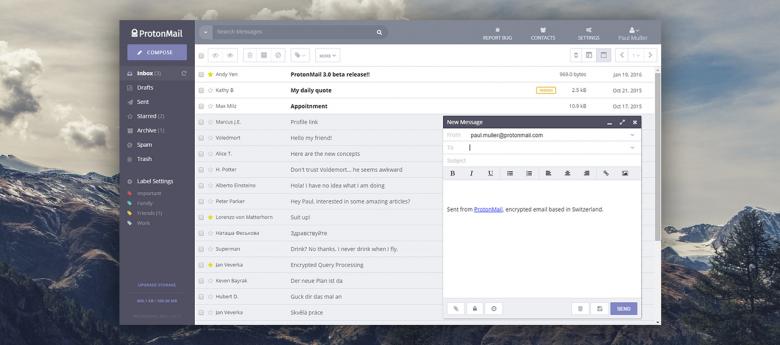Swiss start-ups provide competition for WhatsApp, Gmail and Facebook
Communications security has become a major social issue. In Switzerland some twenty companies have developed comparable software solutions for chatting, messaging and data storage which respect user privacy.
The revelations made by Edward Snowden concerning the surveillance methods of the United States’ National Security Agency (NSA) had one advantage. They showed that the means we use to communicate with each other – Skype, WhatsApp, Gmail, iMessage, Facebook Messenger, and so on – are not secure enough. The services in widest use are not sufficient to protect the privacy of users. In Switzerland there are some twenty companies that have developed applications comparable to those offered by the giants of Silicon Valley – but which use only encrypted communications. Examples are Threema, ProtonMail and Wire.
An alternative to WhatsApp
Established in 2012 by developers from the canton of Schwyz, the start-up Threema has developed a messaging service of the same name that can compete with WhatsApp. Compatible with iOS and Android devices, Threema is a paid application (2 francs) that encrypts texts, images and geolocation data. As a reminder: encryption is the generic term for the entirety of the techniques used for encoding voice or text communications by means of an algorithm and an encryption key. Encoding is the process of converting a message into code that recipients can decode if they know the algorithm and have the decryption key.

In Threema’s case, encoding is performed using encryption keys. Only the receiver’s mobile device is able to read the information sent. Users can choose whether to synchronise their full contact lists or to enter new contacts manually by scanning the QR codes. The only fly in the ointment is that the company has not been very transparent with regard to the security of its source code, which has not yet been submitted to an independent audit.
Because of the threat of terrorism, all companies that offer communication encryption solutions now find themselves on the radar of governments concerned that those services could also be used for exchanging information in the planning of attacks. Following the shootings in Paris in November 2015, Threema, like all of its competitors, became a target of controversy. According to federal authorities, the jihadists who planned the attacks had done so with the help of the application. Those accusations have been denied by the Schwyz-based start-up.
Email by ProtonMail
Andy Yen, the 28-year-old founder of ProtonMail, makes no bones about it: he owes a debt of gratitude to Edward Snowden. The Geneva-based start-up, founded in 2013, specialises in secure email – and the success it has known could not have been matched without the sensational revelations of the former computer expert from the NSA, the American intelligence service. Voted the most promising Swiss start-up of 2015 by the prestigious British magazine Business Insider, ProtonMail has succeeded where many others have failed: democratising encryption solutions for electronic messaging.
ProtonMail’s security service is based on the Open PGP encryption standard, which is used for the encryption and authentication of electronic mail. All of its software is open source: a guarantee of transparency vis-à-vis its users, who can also contribute collectively to improving the service. Transparency and faultless security: a magic combination for the Geneva-based start-up – opening the door to a recent cooperation agreement with Facebook. Since June 2015, ProtonMail has been responsible for the sending of encrypted messages via the popular social network.
It was a lucky coincidence that led to the birth of ProtonMail in 2013, the brainchild of Andy Yen, Jason Stockman and Wei Sun. The three scientists, who at that time were doing theoretical research at CERN, decided to create an in-house secure messaging system for communicating with each other. After eight months of development, they tested the beta version of the new service on a sampling of 10,000 people. It was well received and became a marketable product.

In March 2015, ProtonMail, which is headquartered in Plan-les-Ouates (GE), launched a funding campaign to raise USD 2 million to help it keep up with the demand for its secure communications tool. But in November of that same year events took a dramatic turn. ProtonMail became victim to hacking attacks of a rare ferocity. It took the young company weeks to get itself back on its feet. Today, it is once again on the path of success. ProtonMail has doubled the number of its users since the election of Donald Trump as President of the United States. The secure email service now has almost 2 million users around the globe.
Messaging and data storage
Two years ago, Threema got a new competitor: WIRE. In the wake of the public outcry surrounding information sharing between Facebook and WhatsApp this past autumn, the new messaging service WIRE has joined the fight to defend online privacy. It was between Zug and Berlin that the idea for WIRE was born. The company was founded by Janus Friis (former founding member of Skype), Jonathan Christensen and Alan Duric, and offers an open source, encrypted messaging system that functions intuitively. A major plus is that it also supports high-quality video calls and the transfer of colour GIFs.
Since it was launched in December 2014, the application has been downloaded to some 5 million Android devices, and as many iOS devices. The app’s success has prompted WIRE to increase its current staff of 65 by ten new recruits in the coming months. Though headquartered in Zug, the budding young company has settled its research and development department in Berlin.

As for its business model, the main cornerstone is essentially paid premium services, such as extra storage space. WIRE is also able to accommodate the communication demands of large companies. The WIRE messaging service has the capacity to allow more than 200 users to take part in the same conversation simultaneously. For the moment, the Swiss start-up is the only such service available on the business market: a competitive advantage that it hopes to cash in on.




